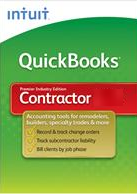We've said it before, and we'll say it again – this has been a challenging few months for all of us, but there is no better time to think seriously about your business.
We all understand the economy has been tough for construction owners. I know you have made severe adjustments in your lifestyle and your businesses; however, remember this too shall pass because there is nothing new under the sun.
The key to building value in your construction business is to plan the process in a systematic way, whether you're aiming to grow your business in any economy or groom it to get a better price from a buyer. In this article, we have compiled a few tips to create value in your industry.
Read More
Topics:
Construction Accounting,
Business Process Development For Construction,
Contractor,
Contractor Tips,
Contractor Operating Tips
Managing cash flow is a vital part of running a successful construction business. Some contractors think managing cash flow means keeping track of how much money enters and leaves their business, but there's actually more that goes into it.
[Starting Cash + Cash In - Cash Out] = Cash Flow
Contractors and sub-contractors know there is more to profits than what is shown above, and most of you rely on your "gut feel" to see when the project has made a profit or not.
Cash flow forecasting is an incredibly valuable tool that helps you anticipate cash flow issues, plan for days when your cash flow is limited, and show the bank that you are prepared. It's a necessary process that you shouldn't ignore.
Read More
Topics:
Construction Cash Flow,
Construction Accounting,
Contractor,
Contractor Tips,
Contractor Operating Tips,
crisis
“How much should I spend on marketing?” Most construction business people ask me this question at some stage. Many small company owners find working out how much to spend on marketing a tricky exercise to calculate.
Generally, there are five ways to work out a marketing budget for the year. Remember that these are marketing budgets, not advertising budgets. Marketing covers everything you do in your business that creates awareness, including such activities as advertising, brochures, competitions, trade shows, demonstrations, travel, direct mail, email campaigns, your website, and sponsorship.
Read More
Topics:
Construction Accounting,
Contractor,
Contractor Tips,
Contractor Operating Tips,
millennial contractors,
boomer contractors
Bootstrapping is figuring out how to reduce the cash you need to start or re-start your business, by eliminating any unnecessary overheads while finding out who will give you a hand.
If for whatever reason, you're not able to raise enough capital to start-up, you might be able to get what you need by 'bootstrapping' (finding what you need through unconventional or low-cost methods):
Have others lend what you need
You don't have to purchase new equipment to start your business. Think about what items you might be able to borrow over the short term or do without until the business grows.
Draw up a list of your asset needs and make a determined effort to borrow from others what you can while searching online for second-hand items that will save your business money. Are there people you know that are already in the construction business who could lend you what you need?
Read More
Topics:
Working Capital,
Construction Accounting,
Contractor,
Contractor Tips,
Contractor Operating Tips,
bootstrapping
Dealing with unexpected cash-flow difficulties, even if you're working hard to avoid shortfalls, is hugely distracting. A formerly reliable client might take much longer to pay than anticipated leaving you out of pocket. If you're starting a construction business, it could simply be taking longer than expected to turn a profit in these trying times.
Red light warnings
Develop red light systems to warn you automatically if something needs querying:
- Check as early as possible if leads, orders, or sales, fall below a certain threshold, or a substantial customer ends their subscription (recurring service).
- Pay attention to your Key Performance Indicators. Make sure you have regular feeds of how your business is performing.
- You also need to know about any substantial invoices that are in dispute, particularly overdue debts and clients exceeding their credit limits.
Building productive relationships with your key suppliers is important, so they are prepared to extend extra credit to you when you need it.
If you have a properly set up accounting software, then it should be relatively easy to view your red flags weekly, monthly (or any period you set).
Read More
Topics:
Construction Cash Flow,
Construction Accounting,
Contractor,
Contractor Tips,
Contractor Operating Tips,
crisis
These days, it’s inevitable that a diverse group of older and younger workers cross paths in the construction industry. After all, the young, tech-savvy, socially conscious demographic known as Gen Y (Millennials) and Gen Z are currently the largest living generation in the U.S., navigating the workforce in record numbers. And the boomers may be retirement age, but that doesn’t mean they’re ready to stop working. Many baby boomers are choosing to enjoy “encore careers” – jobs that allow them to continue to apply their skills and experience to personally meaningful projects.
Here are a few ways to help these two groups work together, so your construction business benefits from their unique and complementary skills.
Read More
Topics:
Construction Accounting,
Contractor,
Contractor Tips,
Contractor Operating Tips,
millennial contractors,
boomer contractors
It's natural for small business owners to think that they won't be victims of cyber attacks. Most of the news surrounding hacking and data breaches involve large corporations, but that is because that's where a high number of victims are affected. Hackers may find they have an easier time going after small businesses and start-ups that aren't prepared for a security breach.
So while they might get less information from a small business, thieves will have an easier time accessing that information. If your construction company keeps any time-sensitive information on a computer network—whether that is personal information, credit card details, or other vital data—you need to ensure your cybersecurity is top-notch, so you, your business and your clients are fully protected.
Read More
Topics:
Construction Accounting,
Contractor,
Contractor Tips,
Contractor Operating Tips,
security,
cybersecurity
Business dashboards are a valuable business intelligence tool, offering an "at-a-glance" big picture view of a company's performance.
Some construction business owners use a dashboard to track KPIs (Key Performance Indicators) relevant to just one aspect of their business, such as sales growth, marketing, or financial data. Others rely on an executive dashboard for an overview of data culled from various sources (e.g., their accounting software, CRM tools, and website analytics).
The great advantage of a dashboard is that it presents and compares complex data drawn from several sources using visual tools (i.e., tables, line graphs, and bar graphs). With access to this consolidated data – information that would take hours to compile and analyze on your own – business owners are empowered to make more informed real-time business decisions.
Read More
Topics:
Construction Accounting,
Key Performance Indicators,
KPI,
Contractor,
Contractor Tips,
Contractor Operating Tips
If you're a small business owner whose construction company hasn't gone through hard times, that's great, but it's likely to happen at some point. As much as we dream about being brilliant enough in this industry that we'll never face slow times, there are many things beyond our control that can negatively affect our organization.
Here are six tips for getting your business through difficult periods so you can look forward to many more years of construction business ownership:
1. Take care of your employees
Workdays lost to sickness are a considerable cost to the company and a threat to productivity. Regardless of health threats and virus spread, the workplace itself is a source of infection, and you can reduce the risk of causing absence in your employees by implementing control measures to ensure the environment is clean and safe.
Read More
Topics:
Construction Accounting,
Contractor Challenges,
Contractor,
Contractor Tips,
Contractor Operating Tips
Preparing for tax season is a year-round endeavor. Well-organized small businesses are better positioned to minimize their tax bill while avoiding penalties associated with missing or inaccurate information.
Tip number one for construction company owners is to update financials every month, using a streamlined software or cloud-based system. This way, come tax time, everything you need is all in one place.
Second - The Profit And Loss Balance Sheet is what Tax Accountants use.
The numbers on these reports offer a summary snapshot of your business. They are referred to and reviewed over and over by banks and others.
Read More
Topics:
Networking,
Construction Accounting,
Contractor,
Contractor Tips,
Contractor Operating Tips,
small business connections










































